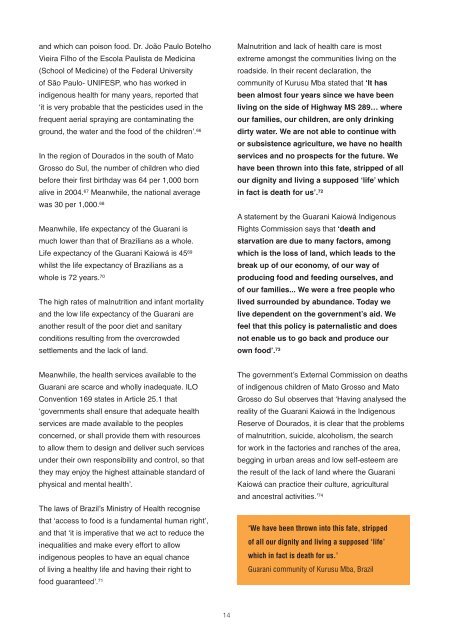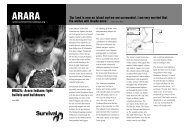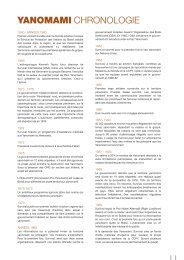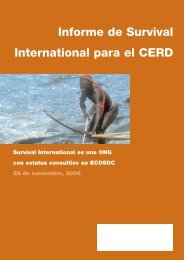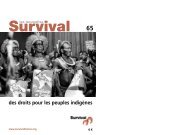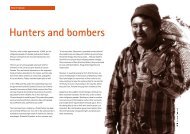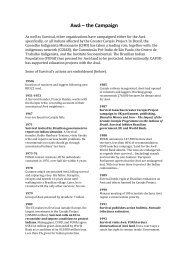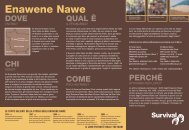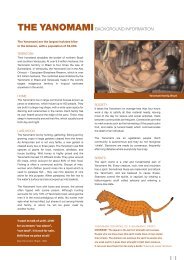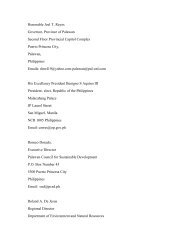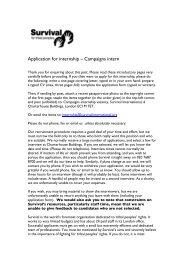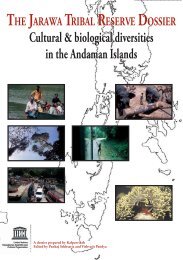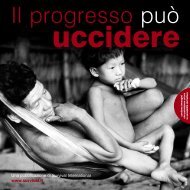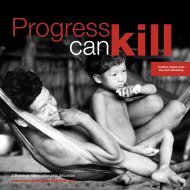violations of the rights of the guarani of mato grosso do sul state, brazil
violations of the rights of the guarani of mato grosso do sul state, brazil
violations of the rights of the guarani of mato grosso do sul state, brazil
You also want an ePaper? Increase the reach of your titles
YUMPU automatically turns print PDFs into web optimized ePapers that Google loves.
and which can poison food. Dr. João Paulo BotelhoVieira Filho <strong>of</strong> <strong>the</strong> Escola Paulista de Medicina(School <strong>of</strong> Medicine) <strong>of</strong> <strong>the</strong> Federal University<strong>of</strong> São Paulo- UNIFESP, who has worked inindigenous health for many years, reported that‘it is very probable that <strong>the</strong> pesticides used in <strong>the</strong>frequent aerial spraying are contaminating <strong>the</strong>ground, <strong>the</strong> water and <strong>the</strong> food <strong>of</strong> <strong>the</strong> children’. 66In <strong>the</strong> region <strong>of</strong> Doura<strong>do</strong>s in <strong>the</strong> south <strong>of</strong> MatoGrosso <strong>do</strong> Sul, <strong>the</strong> number <strong>of</strong> children who diedbefore <strong>the</strong>ir first birthday was 64 per 1,000 bornalive in 2004. 67 Meanwhile, <strong>the</strong> national averagewas 30 per 1,000. 68Meanwhile, life expectancy <strong>of</strong> <strong>the</strong> Guarani ismuch lower than that <strong>of</strong> Brazilians as a whole.Life expectancy <strong>of</strong> <strong>the</strong> Guarani Kaiowá is 45 69whilst <strong>the</strong> life expectancy <strong>of</strong> Brazilians as awhole is 72 years. 70The high rates <strong>of</strong> malnutrition and infant mortalityand <strong>the</strong> low life expectancy <strong>of</strong> <strong>the</strong> Guarani areano<strong>the</strong>r re<strong>sul</strong>t <strong>of</strong> <strong>the</strong> poor diet and sanitaryconditions re<strong>sul</strong>ting from <strong>the</strong> overcrowdedsettlements and <strong>the</strong> lack <strong>of</strong> land.Malnutrition and lack <strong>of</strong> health care is mostextreme amongst <strong>the</strong> communities living on <strong>the</strong>roadside. In <strong>the</strong>ir recent declaration, <strong>the</strong>community <strong>of</strong> Kurusu Mba <strong>state</strong>d that ‘It hasbeen almost four years since we have beenliving on <strong>the</strong> side <strong>of</strong> Highway MS 289… whereour families, our children, are only drinkingdirty water. We are not able to continue withor subsistence agriculture, we have no healthservices and no prospects for <strong>the</strong> future. Wehave been thrown into this fate, stripped <strong>of</strong> allour dignity and living a supposed ‘life’ whichin fact is death for us’. 72A <strong>state</strong>ment by <strong>the</strong> Guarani Kaiowá IndigenousRights Commission says that ‘death andstarvation are due to many factors, amongwhich is <strong>the</strong> loss <strong>of</strong> land, which leads to <strong>the</strong>break up <strong>of</strong> our economy, <strong>of</strong> our way <strong>of</strong>producing food and feeding ourselves, and<strong>of</strong> our families... We were a free people wholived surrounded by abundance. Today welive dependent on <strong>the</strong> government’s aid. Wefeel that this policy is paternalistic and <strong>do</strong>esnot enable us to go back and produce ourown food’. 73Meanwhile, <strong>the</strong> health services available to <strong>the</strong>Guarani are scarce and wholly inadequate. ILOConvention 169 <strong>state</strong>s in Article 25.1 that‘governments shall ensure that adequate healthservices are made available to <strong>the</strong> peoplesconcerned, or shall provide <strong>the</strong>m with resourcesto allow <strong>the</strong>m to design and deliver such servicesunder <strong>the</strong>ir own responsibility and control, so that<strong>the</strong>y may enjoy <strong>the</strong> highest attainable standard <strong>of</strong>physical and mental health’.The laws <strong>of</strong> Brazil’s Ministry <strong>of</strong> Health recognisethat ‘access to food is a fundamental human right’,and that ‘it is imperative that we act to reduce <strong>the</strong>inequalities and make every effort to allowindigenous peoples to have an equal chance<strong>of</strong> living a healthy life and having <strong>the</strong>ir right t<strong>of</strong>ood guaranteed’. 71The government’s External Commission on deaths<strong>of</strong> indigenous children <strong>of</strong> Mato Grosso and MatoGrosso <strong>do</strong> Sul observes that ‘Having analysed <strong>the</strong>reality <strong>of</strong> <strong>the</strong> Guarani Kaiowá in <strong>the</strong> IndigenousReserve <strong>of</strong> Doura<strong>do</strong>s, it is clear that <strong>the</strong> problems<strong>of</strong> malnutrition, suicide, alcoholism, <strong>the</strong> searchfor work in <strong>the</strong> factories and ranches <strong>of</strong> <strong>the</strong> area,begging in urban areas and low self-esteem are<strong>the</strong> re<strong>sul</strong>t <strong>of</strong> <strong>the</strong> lack <strong>of</strong> land where <strong>the</strong> GuaraniKaiowá can practice <strong>the</strong>ir culture, agriculturaland ancestral activities.’ 74‘We have been thrown into this fate, stripped<strong>of</strong> all our dignity and living a supposed ‘life’which in fact is death for us.’Guarani community <strong>of</strong> Kurusu Mba, Brazil14


